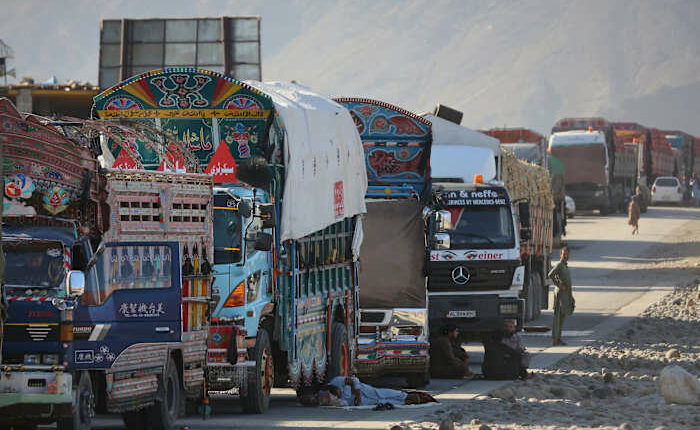Share this @internewscast.com

PESHAWAR – On Saturday, Pakistan partially reopened the Torkham border crossing with Afghanistan, permitting thousands of Afghan refugees who had been stuck to return to their homeland, as per official reports.
However, restrictions still apply to other cross-border activities, including trade.
This decision follows the closure of all border crossings with Afghanistan on October 12, a move prompted by deadly clashes in which both nations claimed multiple troop casualties.
The nearly three-week shutdown left thousands of Afghan refugees stranded and halted hundreds of trucks loaded with goods, disrupting vital trade links between the two countries.
The border was reopened after Pakistan and Afghanistan reached a ceasefire agreement, following almost a week of negotiations mediated by Turkey and Qatar, aimed at averting a broader regional conflict.
Authorities have confirmed that no further exchanges of gunfire have occurred since the ceasefire took effect along the 2,611-kilometer (1,622-mile) boundary known as the Durand Line, which Afghanistan has historically refused to formally acknowledge.
Thousands of Afghan refugees had been moved to a temporary camp near the border, while hundreds more waited along the roadside for the crossing to reopen. Despite the partial reopening, trade across the frontier remains suspended on both sides.
Local officials at the Afghan side told The Associated Press that the gate was reopened Saturday morning exclusively for Afghan refugees, with thousands expected to cross back into Afghanistan throughout the day.
They urged all other travelers to refrain from using the crossing until further notice.
A video released by the Information and Culture Department of Afghanistan’s eastern Nangarhar province showed local officials and Afghan soldiers standing at the Torkham gate holding flowers to welcome returning refugees as they crossed back into their country.
The development came a day after Afghanistan’s ambassador to Pakistan, Ahmad Shakeeb, wrote on X that large numbers of Afghan refugees remained stranded because of Pakistan’s closure of border crossings.
On Friday, Pakistani Foreign Ministry spokesman Tahir Andrabi said the Afghan ambassador had violated diplomatic norms by airing his grievances on social media instead of communicating through Pakistan’s Foreign Ministry.
Since 2023, Pakistan has launched a campaign to deport immigrants living illegally in the country. More than a million Afghans have been repatriated as part of the effort.
Earlier this month, Pakistan’s military said it carried out airstrikes on the hideouts of the Pakistani Taliban inside Afghanistan, killing dozens of people it described as insurgents. Afghan officials denied the claim, saying civilians were among the dead, and said Afghan forces had struck Pakistani military posts in retaliation, killing 58 soldiers. Pakistan’s military acknowledged losing 23 troops in the fighting.
The violence prompted Qatar to invite delegations from both sides to Doha, where they agreed to a ceasefire on Oct. 19. It was followed by six days of talks in Istanbul that continued until Thursday night, when the two sides agreed to maintain the truce.
Pakistan has seen a sharp rise in militant attacks in recent months, most claimed by the Pakistani Taliban, known as Tehrik-e-Taliban Pakistan. The group, designated a terrorist organization by both the United States and the United Nations, is separate from the Afghan Taliban but has been emboldened by the Afghan group’s takeover of Kabul in 2021.
Copyright 2025 The Associated Press. All rights reserved. This material may not be published, broadcast, rewritten or redistributed without permission.









